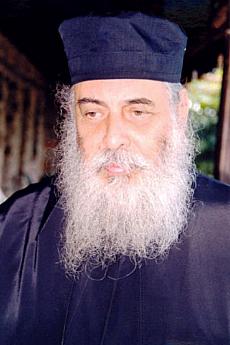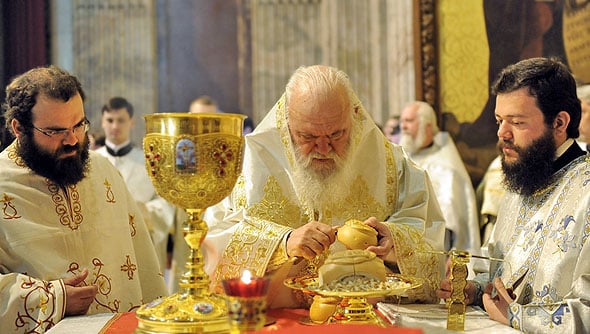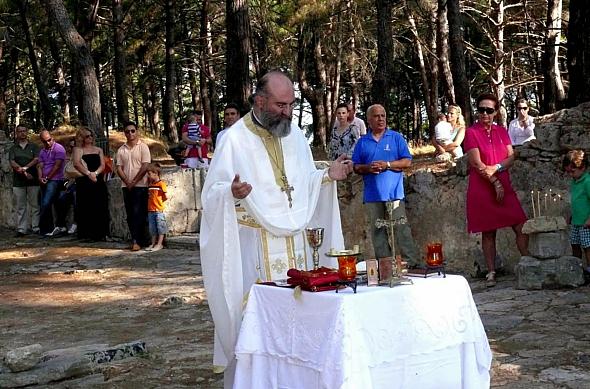| Photo from the article Streams Of Living Orthodoxy In English Popular Tradition |
Abbot George Kapsanis of Gregoriou
Pemptousia
Part 1 (from here)
We
usually characterize people as rational and independent beings. These
attributes are correct enough, but don’t convey human nature in its
completeness.
 Through the liturgical experience, we
feel that, more than anything, people are liturgical beings. They were
made to serve, to offer themselves and the whole world to God with
gratitude, praise and worship, to unite with God, to be sanctified, to
live, through this continual offering/sacrifice/service.
Through the liturgical experience, we
feel that, more than anything, people are liturgical beings. They were
made to serve, to offer themselves and the whole world to God with
gratitude, praise and worship, to unite with God, to be sanctified, to
live, through this continual offering/sacrifice/service.
Rationality, independence and the other
attributes were given to us for this reason, so that we can put
ourselves into this liturgical relationship with the Triune God. In this
liturgical ascent, people act as being ‘in the image’ and are elevated
to being ‘in the likeness’.
Life in Paradise was a Divine Liturgy.
Together with the angels, Adam and Eve served the Holy Trinity. With the
fall into egocentrism they lost the possibility of offering themselves
and the world to God in a Eucharistic manner and thus of taking part in
the joint ministry in Paradise.
Self-exiled from the Liturgy in
Paradise, they found themselves on earth without the function of the
Liturgy. ‘The ‘in the image’ was no longer active. Some remnants and
sparks from the prelapsarian function of service remained within them.
These moved them to build altars and to carry out sacrifices to God.
At best, this worship was fragmentary, a
shadow, a type. It didn’t bring people into perfect communion and union
with God. It didn’t give us the Holy Spirit. It didn’t save us from
death. It did, however, encourage in us the desire for the true
Messianic Liturgy. This desire and vision gave hope to the people who
were sitting in darkness and the shadow of death.
The Heavenly Father’s love could not
leave us without liturgical service. By His providence, the Word was
made flesh. Jesus Christ, the Great High Priest, began the joint
ministry of the New Testament.
The Liturgy of the New Testament could
only have been instituted by Christ, because Christ alone was able to
offer Himself and the whole world completely to the Triune God. There
were people who sacrificed in the Old Testament, too. There were no
sacrificial victims. Jesus Christ was the perfect sacrifice and at the
same time the perfect person to perform the sacrifice. The unblemished
sacrifice. The Lamb of God Who takes away the sin of the world…
 People -and the world- without
Liturgical function, being un-liturgized fell into the power of the
devil and of death. With His death on the Cross and His Resurrection,
Christ redeemed us from this enslavement, liberated us and gave us the
chance to take part in the joint ministry of the New Testament. That is,
to offer ourselves to God, to thank God and to praise Him. In being
offered and offering all things with Christ to God, we serve as people.
That is ‘in the image of God’. We become real people.
People -and the world- without
Liturgical function, being un-liturgized fell into the power of the
devil and of death. With His death on the Cross and His Resurrection,
Christ redeemed us from this enslavement, liberated us and gave us the
chance to take part in the joint ministry of the New Testament. That is,
to offer ourselves to God, to thank God and to praise Him. In being
offered and offering all things with Christ to God, we serve as people.
That is ‘in the image of God’. We become real people.
The Liturgy of the New Testament is
greatly superior to the Liturgy in Paradise. Now the High Priest is the
Son of God Himself. The Mother of God and the Saints concelebrate and
together praise the All-Holy Trinity ‘with ceaseless mouths and
unflagging praises’.
Every baptized Orthodox Christian who
dies in order to live takes part in this joint ministry. In this shared
Liturgy people find their true nature and their true repose, their real
‘in the image of God’ self. Outside this shared Liturgy, people may be Homo Sapiens or Homo Economicus
of the Socialist or Capitalist society, but not the rulers of creation,
not the tipping point between the created and uncreated world and ‘in
the image of God’.
The Divine Liturgy of the New Testament
began with the incarnation of the Word and is continued into the far
future by the Great High Priest. Every Divine Liturgy celebrated at the
altars on earth is a participation in time in this timeless, everlasting
Liturgy. ‘We sinners also cry aloud with the Blessed Powers, Master and
Lover of Humankind, and say: ‘Holy You are and Most Holy…’.
Every Priest and Bishop who celebrates
at the earthly altars ‘performs the priestly function of Christ in the
Church’ (canon of Carthage). He doesn’t have his own priesthood. He
takes part in the unique Priesthood of Christ.
Our greatest sin today is that we don’t
have a Liturgical function. We don’t offer and aren’t offered to God and
to our fellow human beings.

Photo from the article Musicians Who Are Converts to Orthodox Christianity
It was once considered an insult to say
that somebody was ‘un-liturgized’. Today, however, because of our
unbelief and hardness of heart, it’s considered natural, whereas it’s
unnatural and weird for people to exercise a Liturgical function.
Even when people today ‘go to church’,
it’s hard to know whether they really do exercise a Liturgical function,
that is whether they take part in the Universal Mystery of the
Eucharist and of the Church, whether they understand the Divine Liturgy
not simply as a religious and social duty but as an offering and
sacrifice to God, in Christ. It’s possible even for someone to celebrate
the Divine Liturgy as a priest and yet in essence to be outside the
Liturgy, because he doesn’t offer himself and all things to God.
These Christians outside the Liturgy,
clergy and laity, basically don’t live. According to the Revelation,
‘You have a name for being alive, but you are dead’ (3, 1).
Liturgy has many meanings in Greek
and Abbot George plays with most of them. It means ‘the Liturgy’,
‘service’, ‘ministry’, and ‘function’ and, while I have tried to find
what seems to me to be the best in each instance, it has not been
possible to convey the overlapping of meanings that are present in the
Greek. For the term ‘αλειτούργητος’, I commend the relevant entry in Lampe, which if, you’ll forgive the pun, is most unenlightening. WJL.
Part 2 (from here)
People who offer ‘your own from your
own, in all things and for all things’ serve God truly and pleasingly.
That is, people who recognize that whatever they have is a gift from
God. They believe that they’ve got nothing of their own to offer.
Everything’s from God and they take from that and offer it to God,
together with themselves, their world and their relations with the
world. They keep nothing selfishly for themselves. They offer themselves
without reservation. They give everything in order to receive
everything. They die in order to live. And they offer everything in
Christ and for Christ. In all things (always) and for all things (for
all God’s gifts).
So the whole of people’s lives (even
after the Divine Liturgy and outside the church) becomes service,
offering, relationship, sacrifice, communion and thanksgiving. The whole
of life is transformed into a theanthropic life.
The two hour Sunday Liturgy becomes a
twenty-four hour, daily Liturgy. As Orthodox, when we speak about a
liturgical life, we don’t mean our short liturgical offering in the
church, but the whole of our life, which, starting with the liturgical
actions in the church, becomes one of liturgy and worship.
Orthodox Christians aren’t
schizophrenic. They don’t live a liturgical life inside the church and
an unliturgized life outside. They spend as much time as they can in
church (Liturgy and services) so that they’ll be able to live outside
the church in a manner as close as possible to the spirit, the climate
and the ethos of the Divine Liturgy.
Through worship in the church, the
theanthropic life becomes ingrained in them and is then capable of
transforming all the facets of their everyday lives.
So Christians permeated by the Liturgy
live in the unity of faith and life, the divine and the human, the
created and the uncreated, the living with the departed, the present age
with the future, their own person with others.
This unity was also experienced by the
Greek, Orthodox people when, and as long as they had an ecclesiastical
life. There are still, in Greece, traditional, Orthodox people and
communities who live in this unity. The centre of the whole life of
traditional Orthodox settlements (villages and neighbourhoods) was the
parish church, as the katholiko is in monasteries. In villages on Evia [Euboea], the parish church to this day is called the katholiki. (i.e. katholiki ekklisia).

Birth, death, baptism, marriage, school,
work, social relations, joys, and sorrows, all the expressions of
social life were linked to the Liturgy and the Church. In the end, they
became the Church. So the everyday functions of life found their unity
and order of precedence within the Divine Liturgy.
The further the Greek people distance
themselves from their Orthodox roots, from their life-giving,
theanthropic tradition, the less the various functions of life are
organically linked to the Divine Liturgy, which is why they stop working
properly, which is to say they fail to unite people or help them to
live as images of God.
The various functions outside the Divine
Liturgy deconstruct the human person. This is clear from the basic
function of life, procreation. Within the Divine Liturgy and the Church,
this fundamental function is transformed, is blessed with grace, and
contributes towards the rounding out of the human person. Outside, it’s
the slave of egotism, it undoes personalities and is a torment. People
today have bitter experience of this situation.
Orthodox coenobitic monasteries are models of how people and their communities should function. The centre is the main church (katholiko).
Buildings and obediences are all organized around the main church. The
starting-point of the common life is the daily celebration of the Divine
Liturgy. The purpose is the worship of God and the offering of the
whole of life to Christ. This is how life can be common, faith and love
universal, death can be vanquished and everything made new and given a
different role in a strange and most fitting adjustment.
| Photo from here |
When the liturgical spirit of the
coenobium -which is the liturgical spirit of Orthodoxy- becomes
ingrained in the Orthodox, they’re preserved from the powerful and
vitiating trend towards secularism. In essence, secularism is an attempt
to organize life outside the Liturgy and the Church.
Orthodox Christians can’t be Orthodox
unless they live liturgically. Unless the Divine Liturgy and worship are
not merely ‘opportunities’ or part of their timetable, but are,
instead, the life-giving shoot grafted on to their lives and
transforming them, the centre, the basis, the beginning and the end.
It’s only through the ‘your own from your own’ in the Divine Liturgy
that people truly become themselves, that is images of God.
Source: The late, former Abbot
Yeoryios (George) of the Holy Monastery of Blessed Gregoriou, from the
periodical «Ο Όσιος Γρηγόριος», § Ο άνθρωπος ον λειτουργικό, περίοδος β΄, vol. 4, pp. 31-5, published by the Holy Monastery of Blessed Grigoriou, the Holy Mountain, 1979.
Click:
Orthodoxy's Worship: The Sanctification of the Entire World
Theosis, St. Silouan and Elder Sophrony
LIVE, BEYOND THE LIMITS!
The Path to Renewal of the Heart
False Black: Gothic Orthodox?
A Deer Lost in Paradise
Lover of Truth: St John, The Wonderworker of San Francisco
Father Seraphim Rose - Living the Orthodox Worldview
The Social Dimension of Orthodox Monasticism
An Orthodox parish in Turkana desert

Δεν υπάρχουν σχόλια:
Δημοσίευση σχολίου